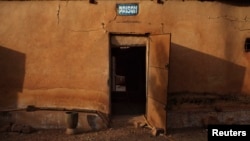The U.N. Human Rights Office warns the release of dozens of rebels charged with serious crimes in Mali threatens the country’s newly-born peace accord.
The office says the 44 men released from prison last month include 16 suspected of committing acts of terrorism, five affiliated with terrorist organizations and three rebels who already have been charged with war crimes. They were exchanged for 45 civilians and troops.
U.N. human rights spokeswoman Ravina Shamdasani told VOA her agency is very concerned that further releases similar to these may be imminent.
“What we are really worried about, in fact, why we are speaking out today in particular, is that we are worried that up to 100 more detainees may be released, although the timing for the release is as yet unknown. And, we understand that this is part of kind of confidence-building measures that are being taken. It is also part of a prisoner exchange that is being conducted,” Shamdasani said.
Rebels in Mali and the government signed an Algeria-mediated peace agreement on June 20, ending a war that broke out in January 2012. That war was the latest effort by Tuareg rebels to gain independence for the northern part of the country. The peace deal with the government grants partial autonomy in the north.
Shamdasani said the release of the prisoners is unconditional. All charges against them have been dropped. She said the consequences of this are very worrying.
“These releases are being done as part of a confidence-building measure, but they are sure to backfire and they are sure not to serve the causes of peace and reconciliation. It was so difficult to come to this agreement. And, in fact, the peace agreement was a very good one. It had provisions against amnesty for gross violations of human rights. This is being violated already,” she said.
Shamdasani said a de facto amnesty would violate international law. She said it is critically important to fight against impunity, to prosecute all gross violations of human rights, and to bring those guilty of these crimes to account.
The spokeswoman added that amnesties prevent people who may have committed war crimes and crimes against humanity from being brought to justice.








